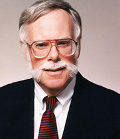W. Bruce Allen

- Professor Emeritus of Business Economics and Public Policy, Regional Science, and Transportation
Contact Information
- Primary Email:
allen@wharton.upenn.edu - Office Phone:
(215) 898-7696
- office Address:
1407 Steinberg-Dietrich Hall
3620 Locust Walk
Philadelphia, PA 19104
Research Interests: freight demand theory, impact of transit investments, railroad and motor carrier economics, supply chain management/logistics, transportation regulation
Activity
Latest Research
Keith W Weigelt, W. Bruce Allen, Neil A Doherty, Edwin Mansfield, Managerial Economics: Theory, Applications and Cases (:, 2005)
All ResearchIn the News
Part II: The Trucking Industry: Transition from Diesel to Natural Gas Is on DeckThe U.S. trucking industry faces major technological disruption – a switch from diesel fuel to natural gas products. This means new – and more expensive – engines and other infrastructure investments. But after a relatively short payback period, substantial fuel savings and environmental advantages offer significant incentives to plunge ahead.…Read More
Knowledge at Wharton - 6/12/2014

